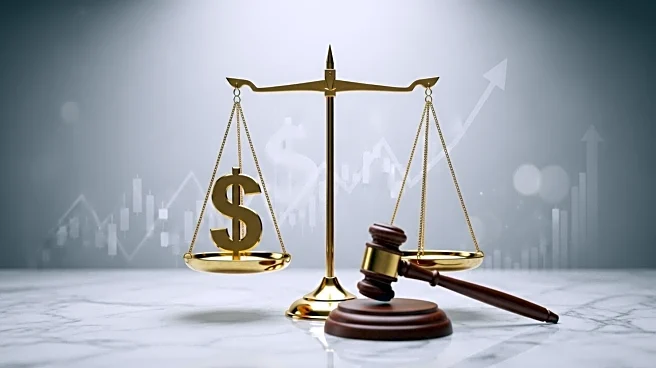What's Happening?
The U.S. dollar has experienced a decline following a weak non-farm payrolls report, which has increased expectations for an interest rate cut by the Federal Reserve. The report showed a significant drop in job growth for August and a rise in the unemployment rate to 4.3%, the highest in nearly four years. This economic data has led to speculation that the Federal Reserve will cut interest rates at its upcoming policy meeting. President Trump is reportedly considering replacing Federal Reserve Chair Jerome Powell, whom he has criticized for not reducing rates as he has demanded. U.S. Treasury Secretary Scott Bessent has called for increased scrutiny of the Federal Reserve's power to set interest rates, reflecting the Trump administration's efforts to exert more control over the central bank.
Why It's Important?
The potential replacement of Federal Reserve Chair Jerome Powell and the anticipated interest rate cuts could have significant implications for the U.S. economy. A change in leadership at the Federal Reserve might lead to a shift in monetary policy, potentially affecting inflation rates, consumer spending, and overall economic growth. The administration's push for lower interest rates aims to stimulate economic activity, but it also raises concerns about long-term financial stability and inflation. Stakeholders such as businesses, investors, and consumers are closely watching these developments, as they could influence market conditions and economic forecasts.
What's Next?
The Federal Reserve's upcoming policy meeting will be crucial in determining the direction of U.S. monetary policy. If interest rates are cut, it could provide a short-term boost to the economy but may also lead to increased inflationary pressures. The decision on whether to replace Jerome Powell as Fed Chair could further impact the central bank's approach to managing the economy. Political leaders, financial markets, and economic analysts will be monitoring these events closely, as they could have far-reaching effects on economic policy and market stability.
Beyond the Headlines
The Trump administration's scrutiny of the Federal Reserve highlights ongoing tensions between political leadership and central bank independence. This situation raises ethical and governance questions about the extent to which political influence should affect monetary policy decisions. The potential shift in Fed leadership could also alter the balance between economic growth and inflation control, impacting long-term economic strategies and priorities.









